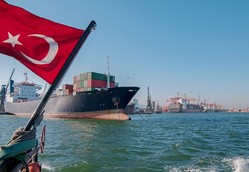 It has almost become tautological to state that Turkey’s geographical location makes the country not only a natural trade route, but also a thriving hub for the dissemination of counterfeit products around the globe.
It has almost become tautological to state that Turkey’s geographical location makes the country not only a natural trade route, but also a thriving hub for the dissemination of counterfeit products around the globe.
Turkey’s economy has enjoyed seismic growth over the past decade, and so has its counterfeit sector. However, in recent years have there have been stringent efforts to counteract the expansion and reduce the trade of counterfeit products in Turkey.
To both improve local industry and trade, and in order to protect its pivotal role in international trade and competition, the Turkish Government has put intellectual and industrial property rights protection near the top of their legislative agenda, and has dedicated significant resources to combating counterfeit and pirated goods at the customs points of entry into the country.
A notable development came earlier this year, when an amendment came into force enabling IP rights holders to file online Customs IP applications. This innovation will be of interest to IP rights holders and manufacturers with operations in Turkey, and likewise should provoke emulation in other key emerging markets.
With implementation of the new system, customs applications are now much faster, and easily tracked by applicants. Applications can be filed by local IP rights holders and/or their representatives; however, applicants are required to submit a Turkish national identity number, coupled with their electronic signature. Foreign IP rights holders can file an application using an electronic signature, and IP rights owners are obligated to submit:
- Documents proving the registered right’s existence
- Documents providing accurate and detailed technical description of goods
- Information regarding the form and kind of counterfeiting the relevant goods are vulnerable to, and how these products may be distinguished from counterfeits
- Power of attorney of the representative
The Customs Directorate will notify the IP rights holder via e-mail if the application has been accepted, within 30 days of the submission date. Although it is totally at the discretion of relevant officials as to whether or not applications will be approved, almost all of these IP applications are directly accepted on a year long prospective basis.
The new online application system provides many advantages to the relevant parties, and enhances the efficiency of IP rights protection. Under the new system, holders are not required to submit applications to each and every customs department separately. The new centralized online application system minimises effort, time spent and physical documentation required to file customs IP applications. Time, cost efficiency, and a lighter work load are the biggest benefits introduced by the new system.
A further development is that the Customs Directorate may now get in touch with brand owners via the same electronic system, enabling IP rights owners to learn of temporary customs seizures within minutes of seizure; such notices were previously sent via post, often several days after detention.
Although the system has brought Turkey’s customs system in line with international standards, the new system is in its infancy and is still yet to be completed. Malfunctions and technical delays can occur during the application process, and the website can work slowly. This could potentially reduce the efficiency that is gained from using such a system. Another key failing is that the Customs General Directorate no longer accept physical applications any longer; all applications must be made online.
Rights owners should also ensure they comply so that customs checks operate efficiently. Holders should endeavour to provide detailed descriptions of and documentation for their goods; including as many pieces of information as possible with their online application. A welcome feature of the new system allows applicants to upload photos and document the differences between original and counterfeit goods, and guides to spotting fakes. Moreover, information regarding the routes, recipients, importers, exporters and holders of suspect goods should, if possible, also be submitted.
The Turkish Government should also consider the implementation of further provisions, particularly the facilitation of training programs for customs officials to assist them in the identification of counterfeit goods. Were such measures enacted, they should include comprehensive education on which brands and products are most likely to be copied. It is also important to incentivize customs officials to be wary of fake products.
The new customs system also requires further features and functionality to allow IP rights holders to enjoy protection based on unfair competition provisions. The new Turkish Commercial Code article 61 clearly stipulates that any products which constitute unfair competition can be seized by customs. A similar detention system should be similarly extended to rights holders; however, the Customs Directorate’s online application system does not allow rights holders to file for such applications at present. Given the importance and broad protection of new unfair competition provisions, a new module to be launched on customs’ online system would surely be appreciated by all stakeholders.
We should emphasize the wording of the new Article 61/A of Trademark Decree Law, which only stipulates that suspects who manufacture, sell or offer for sale fake products will be penalized. Often, the importation, exportation or transit trade of counterfeit goods is cited among the acts that constitute trademark infringement. This precludes IP rights holders from using cost effective and straightforward criminal proceedings - instead, they must rely on costly civil proceedings, especially in relation to small shipments.
In conclusion, the new online customs application system offers numerous advantages to enable the flow of legitimate goods, and some to partially disable, or at least minimise, the flow of counterfeit goods.
Primarily, it is most effective as a means of submitting, tracking and updating information on counterfeit goods. Furthermore, it offers cost effective and consumer-centric improvements compared to the old legislation. The system guides rights holders to provide the required documents that can serve as evidence against counterfeit goods. This builds better communication between customs officials and IP rights holders, which can help eradicate the risks and threats posed by counterfeit products.
 Uğur Aktekin is a partner at Turkish law firm Mehmet Gün & Partners, where he co-chairs the IP Rights Practice Group, which focuses on trademark, copyright, unfair competition and domain name law.
Uğur Aktekin is a partner at Turkish law firm Mehmet Gün & Partners, where he co-chairs the IP Rights Practice Group, which focuses on trademark, copyright, unfair competition and domain name law.
©
SecuringIndustry.com




 It has almost become tautological to state that Turkey’s geographical location makes the country not only a natural trade route, but also a thriving hub for the dissemination of counterfeit products around the globe.
It has almost become tautological to state that Turkey’s geographical location makes the country not only a natural trade route, but also a thriving hub for the dissemination of counterfeit products around the globe. Uğur Aktekin is a partner at Turkish law firm Mehmet Gün & Partners, where he co-chairs the IP Rights Practice Group, which focuses on trademark, copyright, unfair competition and domain name law.
Uğur Aktekin is a partner at Turkish law firm Mehmet Gün & Partners, where he co-chairs the IP Rights Practice Group, which focuses on trademark, copyright, unfair competition and domain name law.
